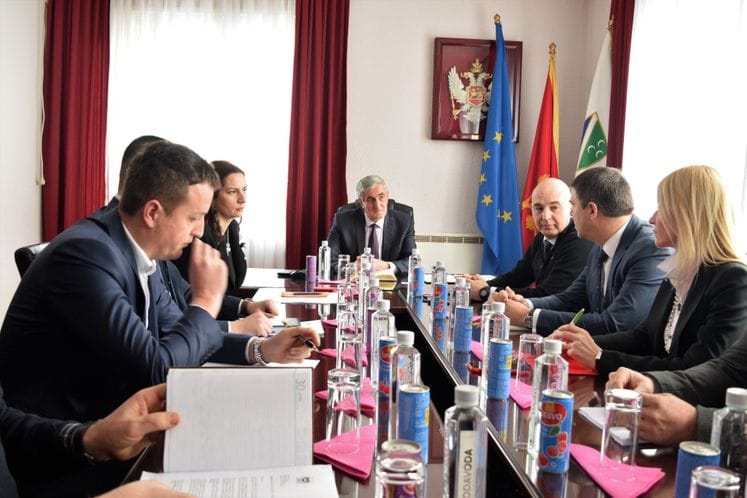- Government of Montenegro
Ministry of European Affairs Drljević in Rožaje: Accession process should be us...
Please note: The page below represents the archived content relating to the previous Government of Montenegro. Some of the information might be inaccurate or outdated.
Archive
Drljević in Rožaje: Accession process should be used to improve quality of life of citizens

Published on: Feb 26, 2019 • 4:07 PM Author: KEI
Representatives of local self-governments are an important part of the reform processes of the entire society and the period of Montenegro's accession to the European Union should be used to strengthen their own capacities and withdraw assets from European funds, Chief Negotiator Aleksandar Drljević said during his visit to the Municipality of Rožaje.
Drljević and negotiators for Chapters 19 and 27, Ljiljana Simović and Saša Radulović, met with President of the Municipality of Rožaje Ejup Nurković and discussed the role of municipalities in accession negotiations and the benefits of future membership, with a focus on social policy and employment, as well as the environment and climate change. He also visited the Gymnasium "30 September "and participated in the public debate "The Role of Local Governments in Accession Negotiations".
The Chief Negotiator emphasised that, apart from the Government, which is committed to the EU accession process, the contribution of the civil sector, the academic and business community and, in particular, the local self-governments is very important.
Given that most of the legal acquis is applied at the local level, it is necessary to include representatives of local self-governments into the negotiation process as much as possible, Nurković highlighted.
By implementing programmes financed from IPA funds, the Ministry of Labour and Social Welfare is preparing for the use of the European Social Fund (ESF), which would meet the third benchmark for closing Chapter 19 Social Policy and Employment. This fund will be available to all citizens of Montenegro after the country joins the EU, Ljiljana Simović pointed out.
Saša Radulović said that Chapter 27 is the most important because it protects life itself, from water to air. As he added, every step on the way to closing this chapter is a development opportunity.
For full press release in Montenegrin please click here.
Drljević and negotiators for Chapters 19 and 27, Ljiljana Simović and Saša Radulović, met with President of the Municipality of Rožaje Ejup Nurković and discussed the role of municipalities in accession negotiations and the benefits of future membership, with a focus on social policy and employment, as well as the environment and climate change. He also visited the Gymnasium "30 September "and participated in the public debate "The Role of Local Governments in Accession Negotiations".
The Chief Negotiator emphasised that, apart from the Government, which is committed to the EU accession process, the contribution of the civil sector, the academic and business community and, in particular, the local self-governments is very important.
Given that most of the legal acquis is applied at the local level, it is necessary to include representatives of local self-governments into the negotiation process as much as possible, Nurković highlighted.
By implementing programmes financed from IPA funds, the Ministry of Labour and Social Welfare is preparing for the use of the European Social Fund (ESF), which would meet the third benchmark for closing Chapter 19 Social Policy and Employment. This fund will be available to all citizens of Montenegro after the country joins the EU, Ljiljana Simović pointed out.
Saša Radulović said that Chapter 27 is the most important because it protects life itself, from water to air. As he added, every step on the way to closing this chapter is a development opportunity.
For full press release in Montenegrin please click here.
GENERAL SECRETARIAT OF THE GOVERNMENT OF MONTENEGRO
SECTOR FOR INFORMING THE PUBLIC ABOUT THE EU AND THE EU ACCESSION PROCESS
SECTOR FOR INFORMING THE PUBLIC ABOUT THE EU AND THE EU ACCESSION PROCESS
Related articles:
Twenty-sixth Newsletter on European integration Dec 29, 2023
Is this page useful?
